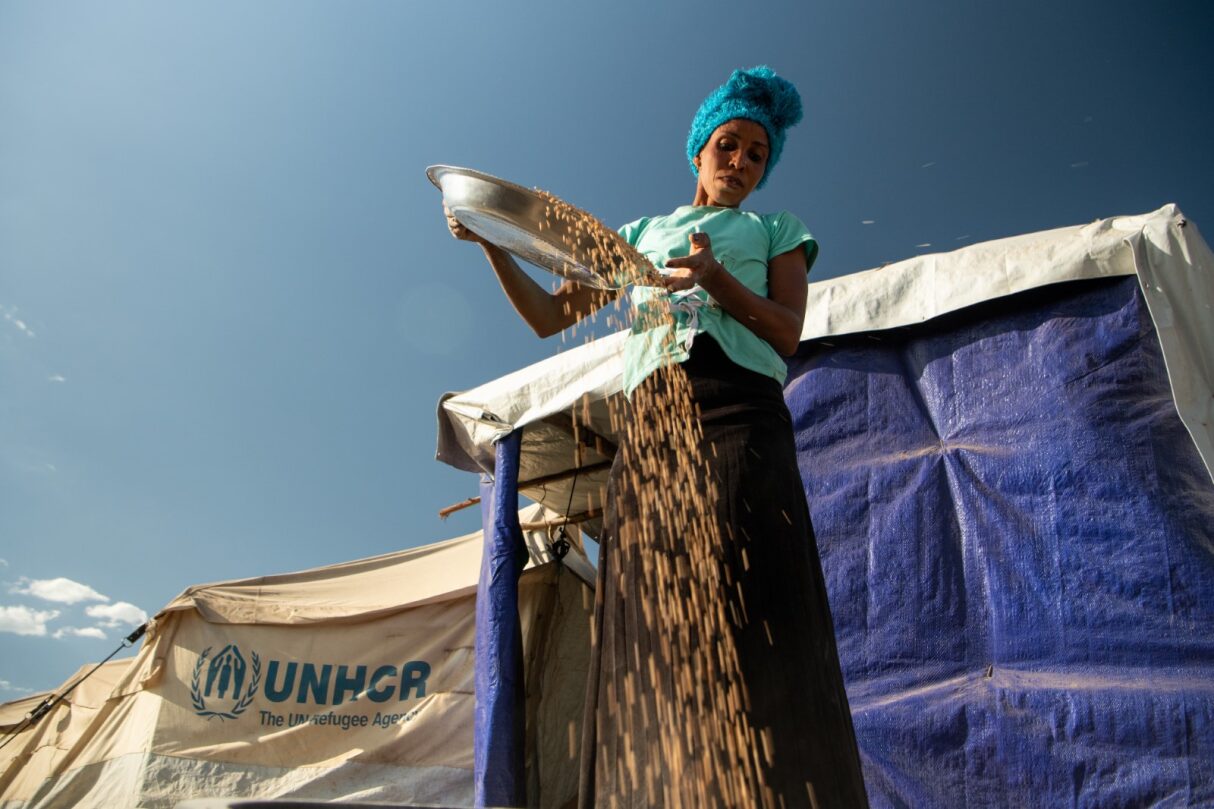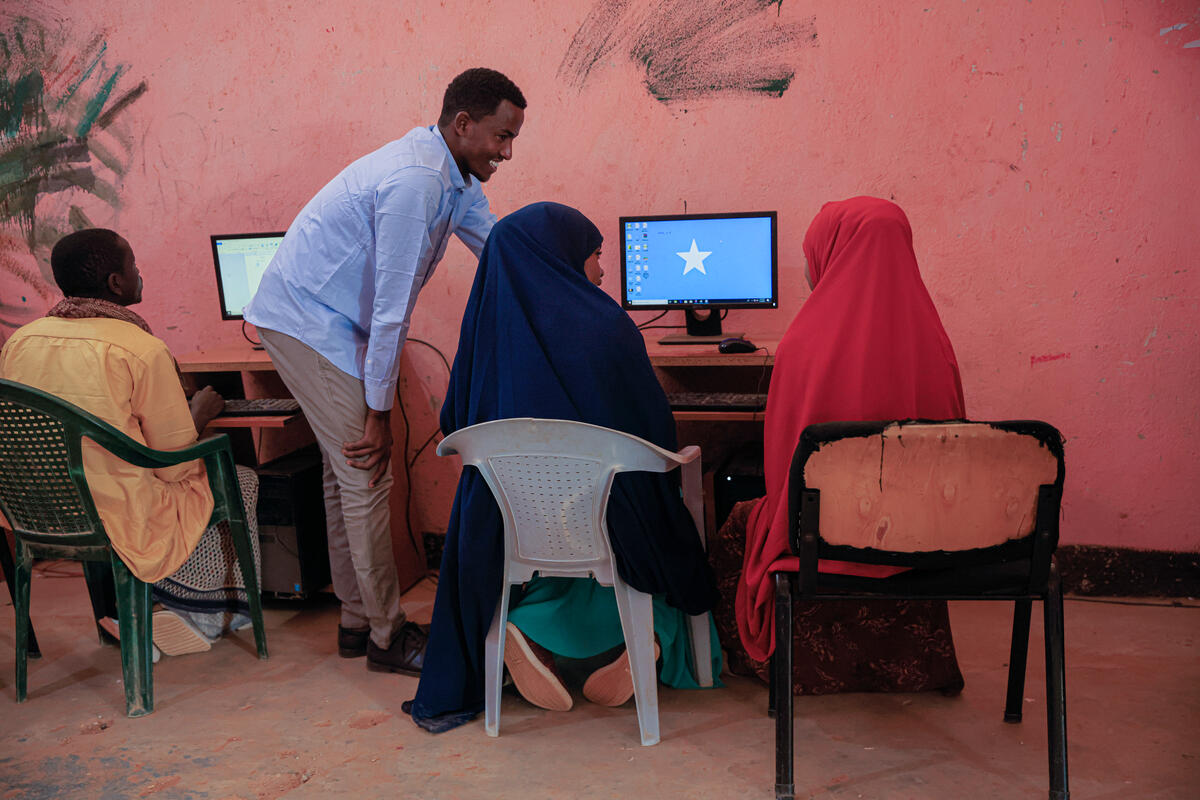Community radio fosters refugee inclusion in Malawi
Community radio fosters refugee inclusion in Malawi

Arsène Bogi Lumière (left) interviews Congolese refugee Chikwanine Leki Chihanza for his programme on Yetu community radio in Dzaleka refugee camp, Malawi.
The 28-year-old refugee has worked for Yetu community radio station in Dzaleka camp since it started broadcasting five years ago.
“Since I was a child, I dreamt of becoming a journalist,” says Arsène. “When Yetu community radio started to broadcast, I thought I would give it a try.”
He began as an intern but was soon working as a reporter and presenter. “What I like about radio is that when you are presenting your programmes, you educate, you entertain and you inform,” he says. “People listen to you and consider presenters as role models. Refugee children also listen to us. They ask me to take them to the radio studio, they want to see how we work.”

Arsène presents his radio programme from the Yetu studio in Dzaleka camp.
Yetu – which means “ours” in Swahili – broadcasts programmes in Chichewa (Malawi’s official language), English, French, Swahili, and Kinyarwanda (Rwanda’s national language). They include local, national, and international news bulletins, as well as live shows focusing on issues such as sexual and gender-based violence, child protection, livelihoods, health, community development and sport.
Success stories
The station employs 17 women and men – nine refugees and eight Malawians – as anchors, reporters, producers and technicians. They source the content for their programmes by interviewing refugees in the camp about their lives, problems, and needs.
“Many refugees are doing well, they have businesses, and they regularly ask to be featured in my community development programmes,” says Arsène. “It’s a good way to show the positive aspects generated by the refugee community.”
Yetu’s journalists also report on the challenges refugees in Dzaleka face, particularly as a consequence of overcrowding. The camp was created in 1994 to accommodate between 10,000 to 12,000 refugees fleeing conflict in the Great Lakes region. It is now hosting over 50,000 refugees, mainly from Burundi, the DRC, and Rwanda. Journalists at the radio station regularly raise awareness in their programmes about overcrowded classrooms for children, endless queues to access services such as water boreholes or health centres, and difficulties finding space to build decent homes.
Recent food cuts by aid agencies due to a lack of funds have increased poverty levels in the camp and forced some women to turn to prostitution to buy food for their families.
According to Jellium Kamphandira, the 26-year-old Malawian manager of Yetu radio station, another sensitive topic is the government’s decision last year to require all refugees who had been living and working in rural and urban areas of the country to relocate to Dzaleka camp.

Arsène (left) chats with Yetu station manager Jellium Kamphandira.
“Many self-sufficient refugees have been forcibly returned to Dzaleka from urban and rural areas in the past months,” says Jellium. “We try to feature everyone’s opinion: refugees’, UNHCR’s and the authorities’. It is not always easy, but we try.”
UNHCR, the UN Refugee Agency, has highlighted that the camp is already overcrowded and that the policy will put further pressure on already overstretched resources. The authorities have cited security reasons for wishing all refugees to be gathered in one site. To date, they have returned some 2,300 refugees to Dzaleka.
Challenging stereotypes
Jellium admits that when he first started to work at the station, he had misconceptions about refugees. But after working with them, his views changed.
“Nobody chooses to be a refugee,” he says. “Refugees are just like us. We have similar values that help us move forward. Over time, my fellow Malawian journalists and myself realized that both communities, refugees and Malawians, are in need of similar services to support their lives. Both communities have the skills to help us thrive.”
Yetu community radio has also contributed to addressing hostility and misunderstandings between refugees and communities surrounding the camp.
Refugees are just like us.

Arsène interviews Valentin Tapsoba (centre), UNHCR Bureau Director for the Southern Africa region, during his visit to Dzaleka in June 2023, as Cyr Modest Kouame (right), UNHCR Representative in Malawi, listens in.
“Through its programmes, the radio station has helped foster refugee inclusion and peaceful coexistence not only in the camp but in Dowa district where Dzaleka is located, as well as in the capital,” explains Cyr Modeste Kouamé, the representative for UNHCR in Malawi. “As listeners interact with both refugee and Malawian presenters and producers, this contributes to a better understanding between communities.”
UNHCR has funded all the radio’s equipment and the station is under the supervision of its partner, Plan International Malawi. In 2020, the radio infrastructure was upgraded so it could transmit across a 100 kilometre-radius. Its programmes can now be heard in Lilongwe, Malawi’s capital, 45 kilometres away. The radio broadcasts on 107.6 FM and online.

Arsène pictured outside the studio after presenting his afternoon show.
Arsène hopes Yetu radio will soon be able to broadcast at regional and national levels so that listeners can learn more about refugees and how they can be an asset for the development of the country hosting them. In five years, he sees himself working for an international radio outlet.
“I would love to work for the BBC, that would be a dream come true,” he says. “This job is giving me the incredible opportunity to interact with people from different cultures and backgrounds … And of course, working closely with my Malawian colleagues is very precious as it helps me better understand their culture. At the end of the day, we are all Africans.”









